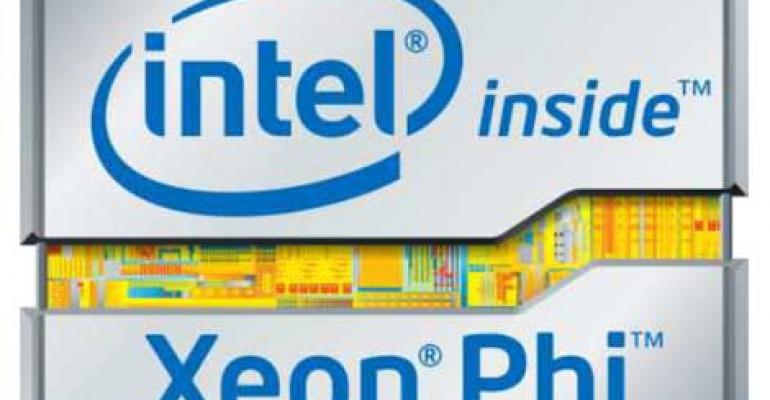
Intel (INTC) has launched new software tools to gain greater insight into data, and disclosed the final form factors and memory configurations for the second generation Phi processor, code named "Knights Landing." The announcement was made at the Supercomputing Conference (SC13) in Denver this week.
"In the last decade, the high-performance computing community has created a vision of a parallel universe where the most vexing problems of society, industry, government and research are solved through modernized applications," said Raj Hazra, Intel vice president and general manager of the Technical Computing Group. "Intel technology has helped HPC evolve from a technology reserved for an elite few to an essential and broadly available tool for discovery. The solutions we enable for ecosystem partners for the second half of this decade will drive the next level of insight from HPC."
Second Generation Xeon Phi
Demonstrating its continued parallel architecture prowess, Intel was featured in the November 2013 Top500 list of the most powerful supercomputers in the world, with two of the top 10 systems using Intel Xeon Phi, and 82.4 percent of all Top500 systems having Intel processors.
At SC13 Intel unveiled how the next generation Intel Xeon Phi product (codenamed "Knights Landing"), available as a host processor, will fit into standard rack architectures and run applications entirely natively instead of requiring data to be offloaded to the coprocessor. This will reduce programming complexity and eliminate "offloading" of the data, thus improving performance and decreasing latencies caused by memory, PCIe and networking. The new design uses 14nm manufacturing technology and will be available as a host CPU with high-bandwidth memory on a processor package.
Knights Landing will also offer developers three memory options to optimize performance.Unlike other Exascale concepts requiring programmers to develop code specific to one machine, new Intel Xeon Phi processors will provide the simplicity and elegance of standard memory programming models.
Data-Driven Discovery
Targeting the increasing growth of unstructured data, Intel announced its HPC Distribution for Apache Hadoop software. The new release combines the Intel Distribution for Apache Hadoop software with Intel Enterprise Edition of Lustre software to deliver an enterprise-grade solution for storing and processing large data sets. This powerful combination allows users to run their MapReduce applications, without change, directly on shared, fast Lustre-powered storage, making it fast, scalable and easy to manage.
Offered through Amazon Web Services Marketplace, a new Cloud Edition of Lustre is available from Intel, as a scalable, parallel file system to maximize storage performance and cost effectiveness. The software is ideally suited for dynamic applications, including rapid simulation and prototyping. In the case of urgent or unplanned work that exceeds a user's on-premise compute or storage performance, the software can be used for cloud bursting HPC workloads to quickly provision the infrastructure needed before moving the work into the cloud. Intel and its ecosystem partners are bringing turnkey solutions to market to make big data processing and storage more broadly available, cost effective and easier to deploy.





